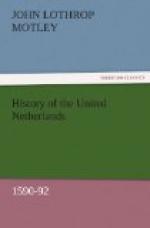The system—then a new one—which Maurice introduced to sustain that little commonwealth from sinking of which he had become at the age of seventeen the predestined chief, was the best under the circumstances that could have been devised. Patriotism the most passionate, the most sublime, had created the republic. To maintain its existence against perpetual menace required the exertion of perpetual skill.
Passionless as algebra, the genius of Maurice was ready for the task. Strategic points of immense value, important cities and fortresses, vital river-courses and communications—which foreign tyranny had acquired during the tragic past with a patient iniquity almost without a parallel, and which patriotism had for years vainly struggled to recover—were the earliest trophies and prizes of his art. But the details of his victories may be briefly indicated, for they have none of the picturesqueness of crime. The sieges of Naarden, Harlem, Leyden, were tragedies of maddening interest, but the recovery of Zutphen, Deventer, Nymegen, Groningen, and many other places—all important though they were—was accomplished with the calmness of a consummate player, who throws down on the table the best half dozen invincible cards which it thus becomes superfluous to play.
There were several courses open to the prince before taking the field. It was desirable to obtain control of the line of the Waal, by which that heart of the republic—Holland—would be made entirely secure. To this end, Gertruydenberg—lately surrendered to the enemy by the perfidy of the Englishman Wingfield, to whom it had been entrusted—Bois le Duc, and Nymegen were to be wrested from Spain.
It was also important to hold the Yssel, the course of which river led directly through the United Netherlands, quite to the Zuyder Zee, cutting off Friesland, Groningen, and Gelderland from their sister provinces of Holland and Zeeland. And here again the keys to this river had been lost by English treason. The fort of Zutphen and the city of Deventer had been transferred to the Spaniard by Roland York and Sir William Stanley, in whose honour the republic had so blindly confided, and those cities it was now necessary to reduce by regular siege before the communications between the eastern and western portions of the little commonwealth could ever be established.
Still farther in the ancient Frisian depths, the memorable treason of that native Netherlander, the high-born Renneberg, had opened the way for the Spaniard’s foot into the city of Groningen. Thus this whole important province—with its capital—long subject to the foreign oppressor, was garrisoned with his troops.




